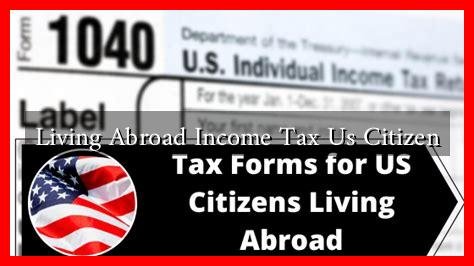-
Table of Contents
Living Abroad Income Tax for U.S. Citizens
For U.S. citizens living abroad, navigating the complexities of income tax can be a daunting task.
. The U.S. is one of the few countries that taxes its citizens on worldwide income, regardless of where they reside. This article aims to clarify the tax obligations of U.S. citizens living overseas, the benefits available to them, and the potential pitfalls they should avoid.
Understanding U.S. Tax Obligations
U.S. citizens are required to file an annual tax return with the Internal Revenue Service (IRS) even if they live and work outside the United States. This obligation applies to all income earned, including wages, dividends, and interest. Here are some key points to consider:
- Filing Requirements: U.S. citizens must file Form 1040, regardless of their location.
- Income Thresholds: The requirement to file depends on income levels, which can change annually. For 2023, single filers must file if they earn more than $13,850.
- Foreign Bank Accounts: If you have foreign bank accounts with a total balance exceeding $10,000 at any time during the year, you must file the Foreign Bank Account Report (FBAR).
Exclusions and Deductions for Expats
Fortunately, U.S. citizens living abroad can take advantage of certain exclusions and deductions that can significantly reduce their taxable income:
- Foreign Earned Income Exclusion (FEIE): For 2023, expats can exclude up to $120,000 of foreign earned income from U.S. taxation by meeting specific requirements under IRS Form 2555.
- Foreign Tax Credit (FTC): If you pay taxes to a foreign government, you may be eligible for a credit against your U.S. tax liability, which can help avoid double taxation.
- Housing Exclusion: Expats can also exclude certain housing costs, which can be beneficial for those living in high-cost areas.
Case Study: The Impact of Tax Treaties
Tax treaties between the U.S. and other countries can further alleviate the tax burden for U.S. citizens living abroad. For example, a U.S. citizen living in the United Kingdom may benefit from the U.S.-UK tax treaty, which helps prevent double taxation on income. This treaty allows for certain types of income, such as pensions and dividends, to be taxed at reduced rates or exempted altogether.
Consider the case of Sarah, a U.S. citizen working in London. By utilizing the FEIE and the FTC, she was able to exclude a significant portion of her income from U.S. taxes while also benefiting from the lower tax rates provided by the U.S.-UK tax treaty. This strategic approach allowed her to maximize her earnings while minimizing her tax liabilities.
Common Pitfalls to Avoid
While there are many benefits to living abroad as a U.S. citizen, there are also common pitfalls that can lead to costly mistakes:
- Failing to File: Many expats mistakenly believe that living abroad exempts them from filing U.S. taxes. This can lead to penalties and interest on unpaid taxes.
- Ignoring FBAR Requirements: Not filing the FBAR can result in severe penalties, including fines that can reach up to $10,000 per violation.
- Misunderstanding Tax Treaties: Not fully understanding the provisions of tax treaties can lead to missed opportunities for tax savings.
Conclusion
Living abroad as a U.S. citizen comes with unique tax obligations and opportunities. By understanding the requirements for filing, taking advantage of exclusions and deductions, and being aware of common pitfalls, expats can effectively manage their tax liabilities. It is advisable for U.S. citizens living overseas to consult with a tax professional who specializes in expatriate tax law to ensure compliance and optimize their tax situation. For more information on U.S. tax obligations for expatriates, visit the IRS website.





